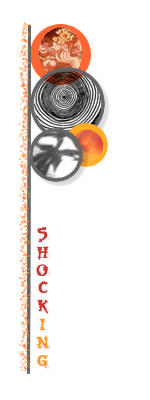 |
Works Cited and Additional Sources:
1. Birkerts, Sven. “Into the Electronic Millenium.”
CyberReader. Ed.Victor J. Vitzanza. London: Allyn and Bacon, 1998.
2. Blau, Herbert. Subtext Based on Nothing. The Tulane
Drama Review. The MIT Press, 1963.
3. Calderwood, James L. “Creative Uncreation In King Lear.”
Shakespeare Quarterly, 1986. Folger Shakespeare Library.
4. Charney, Maurice and Hanna Charney. “The Language of Madwomen
in Shakespeare and His Fellow Dramatists.” Signs. Chicago:
The University of Chicago Press, 1977.
5. Cruttwell, Patrick. “Physiology and Psychology in Shakespeare's
Age.” Journal of the History of Ideas, 1951.
6. E., J.D. Shakespeare and the Legal Process: Four Essays.
Virginia Law Review, 1975.
7. Hillman, David and Carla Mazzio. the body in parts: Fantasies
of coporeality in early modern europe. New York: Routledge,
1997.
8. Jackson, Shelley. Patchwork Girl, or A Modern Monster
(abbreviated as PG). Computer disk. Storyspace for Macintosh or
Windows. Watertown, Mass.: Eastgate Systems, 1995.
9. --. The Melancholy of Anatomy: stories (abbreviated
as MA). New York: Anchor Books, 2002.
10 . Joyce, Michael. Othermindedness: The Emergence of Network
Culture. Ann Arbor: The University of Michigan Press, 2000.
CHs.: 1,3.
11. Knowles, Richard. “Cordelia's Return.” Shakespeare
Quarterly, 1999. Folger Shakespeare Library
12. Laquer, Thomas. Making Sex: Body: Gender From the Greeks
to Freud. Cambridge and London: Harvard UP, 1990.
13 . Neely, Carol Thomas. "Documents in Madness: Reading Madness
and Gender in Shakespeare's Tragedies and Early Modern Culture."
Shakespeare Quarterly, 1991. Folger Shakespeare Library.
14 . Rudnytsky, Peter L. "The Darke and Vicious Place":
The Dread of the Vagina in "King Lear." in Modern Philology.
The University of Chicago Press, 1999.
15.Sloane, Sarah. Digital Fictions: Storytelling in a Material
World. Stamford, Connecticut: Ablex Publishing Corporation,
2000.
16. Spotswood, Jerald W. “Maintaining Hierarchy in The Tragedie
of King Lear.” Studies in English Literature, 1500-1900. Rice
University Press, 1998.
17. Stern, Jeffrey. “King Lear: The Transference of the Kingdom.”
Shakespeare Quarterly, 1990. Folger Shakespeare Library.
1. The webpage on Butler is a modified version
of an essay I wrote last year. I have done some work to integrate
it into this paper, though more work is forthcoming. Butler's theories
about gender and language are important to my understanding of what
Shakespeare may be doing with King Lear on a political level.
|
